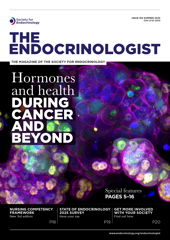Rachael Guenter has been a faculty member of the Department of Surgery in the University of Alabama at Birmingham (UAB), USA, since 2023. She investigates the molecular mechanisms of neuroendocrine cancer and pancreatic ductal adenocarcinoma to develop novel therapeutic approaches, and has published strategies to improve the detection of neuroendocrine tumours (NETs).
Currently, Rachael is focusing on the development of novel theranostic agents for pancreatic cancers and understanding the role of Notch signalling in gastroenteropancreatic NETs. She is particularly interested in developing new treatments for patients with unresectable, advanced disease. She also advocates to increase awareness of neuroendocrine cancer and aims to provide accurate information for patients and the general public.
Could you tell us about your career so far?
As I was working towards my undergraduate degree in chemical and biomolecular engineering at North Carolina State University in 2017, I was fortunate to participate in research. I worked in two labs: one that studied the genetics of plant pathology and one that studied novel systems for water purification. Being exposed to research in college led me to decide to pursue a career in research.
After completing my PhD in cancer biology at UAB in 2021 with Herbert Chen, I undertook a postdoctoral fellowship, and subsequently became a faculty member to run a lab alongside J Bart Rose, who was my mentor for my fellowship. We lead a basic science lab that studies neuroendocrine cancer and pancreatic ductal adenocarcinoma. I enjoy the complexity and diversity of our research projects. The other exciting part of my career is mentoring younger scientists and inspiring them to pursue careers in research.
What inspired you to choose science?
My Dad (a brilliant mechanical engineer!) sparked my inspiration for science, and my undergraduate research experiences solidified the decision to become a scientist.
‘I am also excited about the growing number of young scientists who are dedicating their careers to studying neuroendocrine cancer…’
What do you enjoy most about your work?
I love the process of using the scientific method to achieve a discovery which generates knowledge that no one else yet knows.
Tell us about your current project(s)?
I have two main projects. The first is understanding how the Notch signalling pathway aids the survival and growth of pancreatic NETs. Notch is a developmental pathway that cancer cells can take advantage of to survive. The second project involves attaching radioactive molecules to a nanobody in order to detect and target a specific protein, called calreticulin, on the surface of cancer cells.
What inspired you to lead the NET Models consortium?
I have studied NETs in the laboratory for over eight years, and so have experienced the difficulties associated with a lack of appropriate preclinical models. It is difficult to understand the molecular mechanisms of a tumour when we cannot properly model it in the laboratory. I believe future discoveries require more accurate research models.
What are the biggest challenges in this field?
Lack of NET-specific funding, lack of disease awareness, and lack of appropriate preclinical models. Awareness will help build funding, which will then help build research tools.
What exciting developments are underway?
'By working together, we can solve some of the biggest challenges in the field of NET research.'
As a leader of the NET Models consortium, I of course believe that what this group is doing is incredibly exciting. We are driving an international effort to expand the horizon of NET research by supporting the development of NET models. I am also excited about the growing number of young scientists who are dedicating their careers to studying neuroendocrine cancer, and the integration of patients into research decision-making.
How will the consortium help to continue these developments?
The consortium is building a movement to advance NET models. Through this movement, we are fostering international collaborations, as well as the careers of NET scientists at all stages. The consortium prioritises a diverse set of minds and experiences, and so we integrate not only NET scientists, but also patients, physicians, patient advocates, nurses and veterinarians. By working together, we can solve some of the biggest challenges in the field of NET research.
What are you most proud of in your career, so far?
I am most proud of the knowledge that my research team and I have contributed to cancer research, especially neuroendocrine cancer.
What advice would you give your younger self?
When I was younger, I wanted a career that would fund my expensive hobby of horse riding. As it turns out, research is NOT that career – but, the discoveries I get to make are worth it. I would tell myself to trust in timing, and that everything does happen for a reason.






